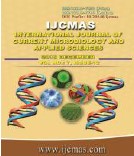Characterization of Enteroviruses in Irrigating Water in Egypt and in Clinical Samples with the Assessment of Ethanolic Extract of Nigella sativa in Response to these Viruses
Waled Morsy El-Senousy1, Faten S. Bayoumi2*, Sara A. Mokhtar3 and Rana K. Abd El-Tawab3
1Department of Water Pollution Research, Environmental Research Division and Food Borne Viruses Group, Centre of Excellence for Advanced Science, National Research Centre, Giza, Egypt 2Department of Microbiology and Immunology, Faculty of Pharmacy, MSA, Department of Immunogenetics, Human Genetics and genome research Division, National Research Centre, Giza, Egypt 3College of Pharmacy, MSA University, Egypt
*Corresponding author
Abstract:
This study aimed to determine enteroviruses using different PCR methods and also studying the effect of ethanolic extract of Nigella Sativa on isolated viruses in vitro. we performed reverse transcription-PCR (RT-PCR), nested PCR and cell culture-PCR followed by real time PCR to monitor the occurrence of enteric viruses in in 23 samples collected from irrigation water sites in El-Giza and El-Menofya Governorates from March 2017 to May 2017; fourteen samples from five rural sites in El-Menofya which no sanitation systems service these regions and nine samples from three urban sites in El-Giza served by sanitation systems were investigated. The comparison of the detection techniques was involved in study. The highly detected virus was Adenoviruses followed by rotaviruses then Noroviruses. Presence of sanitation systems may affect the frequency of enteric viruses in irrigation water. Rotaviruses were the most frequent viruses isolated from the diarrheal samples followed by adenoviruses and finally noroviruses. Considerable reduction of genome copies and infectious units of both rotavirus Wa strain and adenovirus type 7 was observed by treatment with ethanolic extract of Nigella Sativa in vitro.
Keywords: Noroviruses, adenoviruses, Rota viruses irrigating water, Real time PCR, Nigella sativa, RT-PCR, Cell Culture RT-PCR
Download this article as 
How to cite this article:
Waled Morsy El-Senousy, Faten S. Bayoumi, Sara A. Mokhtar and Rana K. Abd El-Tawab. 2018. Characterization of Enteroviruses in Irrigating Water in Egypt and in Clinical Samples with the Assessment of Ethanolic Extract of
Nigella sativa in Response to these Viruses.
Int.J.Curr.Microbiol.App.Sci. 7(12): 3664-3679. doi:
https://doi.org/10.20546/ijcmas.2018.712.415
 Citations
Citations



 National Academy of Agricultural Sciences (NAAS)
National Academy of Agricultural Sciences (NAAS)





